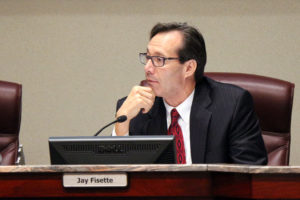 (Updated at 4:40 p.m.) Two days after the Arlington County Board voted to offset a one-cent tax rate cut by eliminating a pay raise for county employees, the Board has changed course.
(Updated at 4:40 p.m.) Two days after the Arlington County Board voted to offset a one-cent tax rate cut by eliminating a pay raise for county employees, the Board has changed course.
County Board Chair Jay Fisette told ARLnow.com Friday afternoon that, after the Board met with representatives from the police and firefighter unions this morning, it decided to cut from other areas to make up the $6.6 million gap in the budget the tax cut will create.
The Arlington County Police Union, the Arlington Police Beneficiary Association and the Arlington Professional Firefighters and Paramedics Association (Local 2800) each released statements denouncing the Board’s decision to go against County Manager Barbara Donnellan’s recommendation to keep the property tax rate at 2014’s level of $1.006 per $100 in assessed value — and to pay for it by eliminating pay raises in favor of a “modest” 1 percent Cost of Living Adjustment and a one-time $500 employee bonus.
The decision was made in the days leading up to Wednesday’s budget mark-up, leading the police and firefighters to question the process and transparency of the Board’s budget process.
“Throughout the budgetary process that started in September 2013, there were no discussions by the County Board that indicated that step increases would be eliminated,” Local 2800 said in a statement. “Only now, six days before the vote, have we been informed… We understand that there needs to be a balance and restraint in the current economic times but there also needs to be transparency.”
The APBA said the cut in step increases would have hit twice as hard because the county changed employees’ healthcare plans this year, resulting in increases in premiums as high as 7 percent for some employees.
“Not only is this budget cut targeting employees in one of the most expensive places to live in the U.S., it also was made at the 11th hour, outside of Arlington’s well-accepted and long-established budget process and after the last opportunity for public comment,” the APBA said in a statement.
“It is the opinion of the APBA and Union that this last minute decision is politically motivated as a newly elected County Board Member was just sworn into office,” APBA member Jim Tuomey said in a separate email. “We feel this is a last minute effort for the County Board to try and ‘win over’ the voters by saving a penny on the real estate tax rate at the expense of all County employees and we have no opportunity to be heard at future work sessions with the budget adoption next Tuesday night.”
Fisette said the Board unanimously decided to cut the tax rate “a few weeks ago,” before the April 8 special election that saw John Vihstadt became the first non-Democrat elected to the Board since 1999 by a 57-41 percent margin over Democrat Alan Howze.
The decision to do away with the step increase came as a shock to the employees because it hadn’t been mentioned in any public hearings or meetings. Moreover, Fisette said, it’s rare that the Board goes away from the county manager’s recommendations on compensation. It’s particularly rare that the Board lowers salaries or cuts pay raises, Fisette said.
“In the past, it was traditionally that the manager’s compensation [recommendation] rarely did change, so they had no reason to worry,” Fisette said. “But we had just been exploring that in the last days and week before we made the final decision.”
The cuts to make up that $6.6 million will now come primarily from a “hiring slowdown,” Fisette said. The county will hold off on filling some of its 200-300 vacant positions. Arlington will also institute “a targeted reduction of a handful of new positions,” and some of the other details of the cuts still must be finalized before the Board’s vote on Tuesday.
“We’re all feeling okay now that we’ve found an alternative that accomplishes what we wanted to accomplish,” Fisette said. “We heard a lot of feedback this year, and the last couple of years,about the increasing tax burden on homeowners, and we felt an obligation to address that since the assessments were higher than we projected.”

